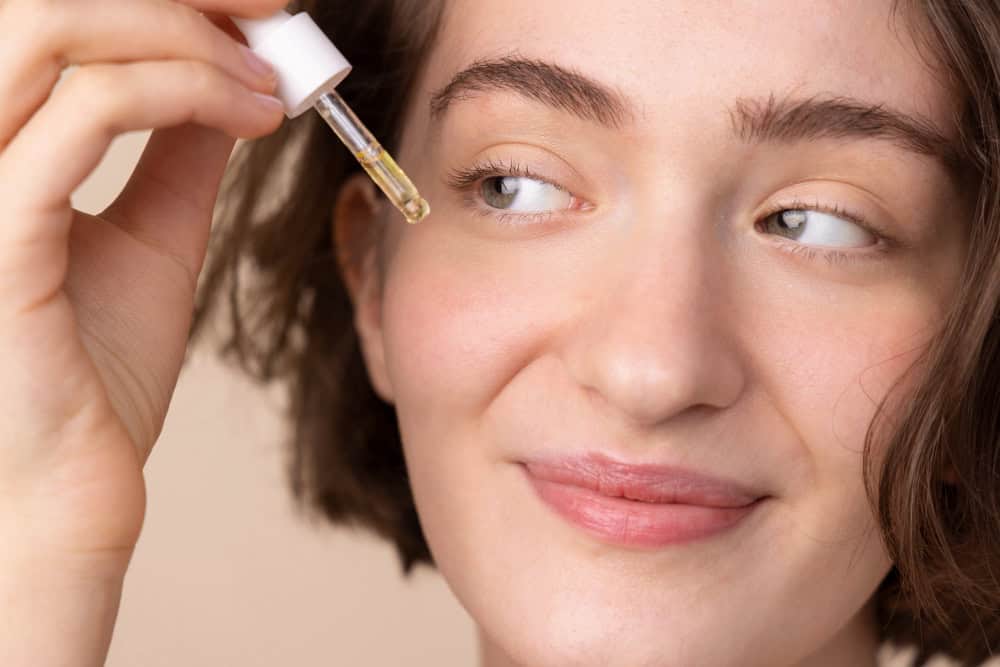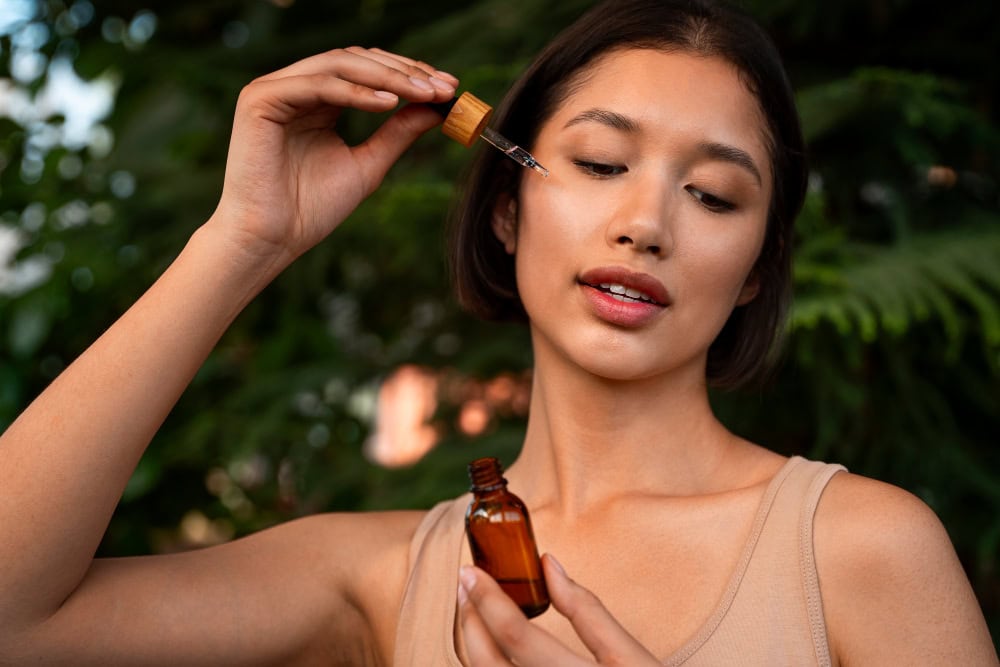
Niacinamide is a widely recognized skincare ingredient known for its ability to reduce dark spots and pigmentation while improving skin texture. But what exactly is Niacinamide? Also called Nicotinamide, it is a form of Vitamin B3 found in foods like meat, fish, green vegetables, and cereals. It is commonly used both as a dietary supplement and an active ingredient in skincare products.
Niacinamide offers numerous benefits for the skin and body, playing a crucial role in maintaining the health of cells on the face and throughout the body. Its skincare effects can be enhanced when combined with other powerful ingredients such as Alpha Arbutin and Vitamin C.
In this blog post, we explore five scientifically supported benefits of incorporating Niacinamide into your daily skincare routine. These impressive advantages will help eliminate any hesitation you may have about adding it to your regimen.
1. Reduces the Visibility of Pores

Niacinamide offers numerous skincare advantages for oily skin. If you have oily or acne-prone skin, you’re likely familiar with the challenge of enlarged pores. These pores can make your skin look unhealthy and tend to trap dirt and sebum.
Niacinamide helps control the skin’s oil production, which makes pores look smaller and their edges firmer. As a result, they become less noticeable to the naked eye. Its non-comedogenic nature is key to how Niacinamide minimizes pores. Non-comedogenic ingredients and products are lightweight and do not block your skin’s pores.
2. Minimizes Fine Lines and Wrinkles

Regular use of niacinamide offers anti-aging benefits for the skin. This form of Vitamin B3 boosts collagen production, helping to diminish signs of aging like fine lines and wrinkles.
Additionally, niacinamide enhances the skin’s barrier function and elasticity over time. When combined with 2% Alpha Arbutin, which reduces melanin production, niacinamide can result in smoother, more youthful-looking skin.
3. Enhances the Skin Barrier

Your skin barrier acts as a protective shield that safeguards your body from free radicals and environmental pollutants. It also helps retain moisture within your body by preventing water loss. The outermost layer of your skin, known as the stratum corneum, serves as this barrier. It consists of the toughest skin cells held together by lipids.
If you’re asking, “How can I naturally strengthen my skin barrier?”, the answer is simple: gently cleanse your skin, keep it well-hydrated, maintain a healthy and balanced diet, and apply sunscreen.
Niacinamide, a type of Vitamin B3 for the skin, promotes the production of ceramides and lipids in your body, thereby reinforcing your skin barrier. It helps prevent moisture loss and shields your skin from pollutants.
4. Regulates Oil Production

Regardless of whether your skin is oily or dry, Niacinamide’s ability to balance oil can be very beneficial. As a form of Vitamin B3 for the skin, Niacinamide influences the sebaceous glands’ sebum production.
By keeping pores clear, it helps prevent acne. When applied in a mild 2% concentration, it reduces breakouts without overly drying the skin. Due to these advantages, Niacinamide is an excellent ingredient to include in skincare routines aimed at controlling oil.
5. Enhances Uneven Skin Tone and Reduces Dark Spots

Niacinamide is widely studied and recommended by dermatologists for its effectiveness in treating hyperpigmentation and dark spots. Several research studies, including one from the National Library of Medicine (USA), have validated Niacinamide’s ability to diminish hyperpigmentation.
Dermatologists endorse this form of Vitamin B3 for addressing dark spots. One of Niacinamide’s main benefits is promoting a glowing complexion. Whether incorporated in a Brightening Face Wash or a Clearing Face Serum, regular use over 4 to 8 weeks will help brighten your skin.
NIACINEMIDE’S BEST FORMULATIONS WITH OTHER ACTIVES
| Niacinamide +… | Why It Works | Best For |
| Niacinamide + Hyaluronic Acid | Boosts hydration while soothing the skin and strengthening the barrier. | Dry, sensitive, and dehydrated skin |
| Niacinamide + Retinol | Reduces irritation from retinol while enhancing anti-aging and brightening effects. | Aging, fine lines, pigmentation |
| Niacinamide + Vitamin C | Brightens the skin, evens tone, and fights free radical damage. (Use in the right pH balance or separate routines) | Dullness, uneven tone, hyperpigmentation |
| Niacinamide + Zinc | Helps control excess oil production and reduces acne-causing inflammation. | Oily, acne-prone skin |
| Niacinamide + Peptides | Boosts collagen production and improves skin elasticity. | Aging, sagging skin |
| Niacinamide + Alpha Hydroxy Acids (AHAs) | Exfoliates dead skin cells while calming irritation and boosting hydration. | Dull, congested skin (use in separate routines or alternate days) |
This table helps clarify which combinations work best together and what skin concerns they target. Would you like me to format it for easy sharing or printing?
What is the Best Type of Niacinamide Product?
Many niacinamide products for topical use are available as serums. Serums serve as additional treatments targeting specific skin issues beyond the usual cleansing, toning, and moisturizing routine.
Niacinamide can also be found in some cleansers and creams.Be sure to read the product labels carefully and follow the usage instructions.The concentration of niacinamide varies among products, with most containing 5% or less. Some studies indicate that a 5% concentration can help reduce fine lines and wrinkles.
If you have sensitive skin, it’s advisable to begin with a lower concentration.On product labels, niacinamide may appear as “niacin” or “nicotinamide.”
Are There Any Potential Side Effects Associated with Niacinamide?
Topical niacinamide is typically safe for use.
However, individuals with existing allergies might have a higher chance of an allergic reaction since niacinamide can trigger the release of histamine in the body.
To perform a patch test before using the product:
-Apply a small amount, about the size of a dime, to your forearm.
-Wait for 48 to 96 hours.
-If you notice redness, discoloration, itching, or swelling in the area, rinse it off and stop using the product.
If no side effects occur, it should be safe to apply the product to other areas.
Conclusion
Topical niacinamide can potentially improve overall skin health. It aids in decreasing inflammation and hyperpigmentation, smoothing out fine lines and wrinkles, among other benefits. Although further studies are needed, niacinamide may help with conditions like dermatitis, psoriasis, and acne.
You should avoid taking niacinamide supplements unless advised by a doctor or healthcare professional. Consult your doctor to learn more about the potential advantages of niacinamide.
FAQs
Can I use Niacinamide if I have sensitive skin?
Yes! Niacinamide is well-known for its soothing properties, making it suitable even for sensitive skin. It helps calm redness and strengthens the skin barrier without irritating.
How long does it take to see results from Niacinamide?
Typically, you can expect to see noticeable improvements in skin texture, brightness, and reduced dark spots within 4 to 8 weeks of consistent use.
Can I layer Niacinamide with sunscreen?
Absolutely! Niacinamide works great under sunscreen and helps enhance your skin’s defense against environmental stressors throughout the day.
Is there any risk of using too much Niacinamide?
Niacinamide is generally well-tolerated, but using more than necessary (like 10% or higher) might cause minor irritation in some cases. Sticking to 2–5% is perfect for daily use.
Does Niacinamide help with acne?
Yes, Niacinamide helps regulate sebum production, reduce inflammation, and minimize the appearance of pores, making it a fantastic ingredient for acne-prone skin.
Recommended Reads
Essential Oils for Stress: 8 Soothing Scents To Help Relax
Forget Coffee, This Japanese Drink Is Your New Secret to That Glass Skin Glow
(The article is written by Mantasha, Executive, Clinical Health & Content, and reviewed by Monalisa Deka, Senior Health Content Editor)